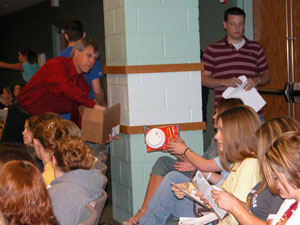By Shelley Grieshop
sgrieshop@dailystandard.com Computers and school supplies won't be the only important items unpacked by college freshmen who arrive on campus this fall.

Thanks to a special gift from the Celina Fire Department, new smoke detectors also will accompany college-bound seniors at Celina High School.
"This is the single most important tool you'll need," Celina firefighter/paramedic Mike Bruns told the 200-plus high school seniors as he discussed the value of smoke detectors Thursday morning in the school lecture hall.
After receiving grant funding of over $19,000, most from the State Fire Marshal's office, the Celina firefighters were able to hand out new smoke detectors and informational handouts to the entire senior class.
Other fire prevention projects also are planned so the money can benefit all age groups, Bruns says. Following the deaths of five Ohio State University students two years ago, and on the heels of a fatal fire that took the lives of three Miami University students last month, the fire department chose to focus their efforts on educating students who soon will be living in dormitories or off-campus housing.
Arson was suspected in the deadly OSU fire. In Oxford, smoke detectors were working in the home when a smoldering cigarette ignited a couch. However, fire officials believe the students did not awake because they were under the influence of alcohol.
The fear is real: Ohio leads all 50 states in the number of college students (12) who have died in fires during the last five years -- 11 of the 12 deaths occurred in off-campus housing. Two-thirds of full-time students live in off-campus housing, according to the U.S. Department of Education.
More than 1,700 fires occur each year in the United States in dormitories and "Greek" housing, causing $2.8 million in damage, statistics show.
About 20 years ago a building code was passed in Ohio to mandate the placement of smoke detectors in structures with four or more units. Although most dormitories fall into that category, off-campus housing may not. For example, the code would not apply to an off-campus home with three leased units or one built before the Ohio Building Code went into effect, says Pieter Wykoff, spokesman for the State Fire Marshal's office.
That's where students and/or their parents must take the initiative. "Find out if there are adequate smoke alarms and put them up yourself if you have to," he said.
Wykoff and Bruns also suggest students change the batteries in their smoke detectors the weekends of the time change or upon completion of each semester or quarter of school.
"And test the batteries once a month. Forty percent of fatal fires in this country occur each year because batteries are dead," Wykoff added.
Bruns, with the help of fellow firefighter/paramedic Brent Vogel and student Jacob Rison, explained how quickly a smoldering cigarette in a couch can ignite (in about nine minutes), and warned that flames aren't usually what kills people.
"It's the toxic gases in the air," he says, adding that 80 percent of fire victims die from the poisonous fumes. "That's what's going to kill you."
The firefighters used a power-point presentation on the school's big screen to get their message across. Images of students who lost friends in college fires, parents whose children perished and the wreckage left behind by the burning buildings flashed before the Celina students. As photographs of the OSU fire victims filled the screen one by one, the room fell silent.
Bruns, a 10-year-veteran of the department, also made his point by telling stories and using pictures from The Daily Standard that featured local fires -- a recent one on Logan Street in Celina and another in Rockford.
The goal of Thursday's event, Bruns said, was to replace the "laid back attitude" that many students have about fire safety with a more keen awareness of the tragedy that can strike.
"I know the college lifestyle is to go out and party a little," he told the students. "I just wouldn't want The Daily Standard headlines to ever read 'Former Celina students killed in fire.' Make the choice to be safe." |

